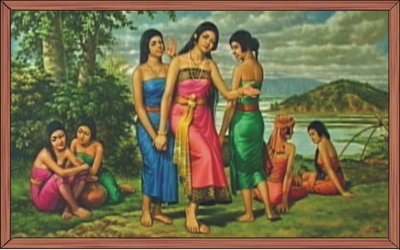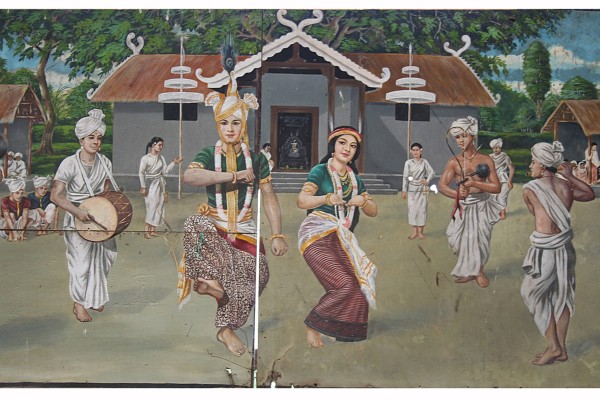Moirang Thoibi - A symbol of women's empowerment
Dr Khelena Gurumayum *

Moirang Thobi and her friend at Loktak Lake
Warning: These images CANNOT be reproduced in any form or size without written permission from the RKCS Gallery
Introduction
Moirang Thoibi is one of Manipuri folklore's most celebrated legendary figures, embodying courage, love, and resilience. Her story, deeply rooted in Manipur's (Kangleipak) cultural history and tradition, transcends time and continues to inspire generations.
Thoibi represents not just a legendary figure but also a symbol of women's empowerment, showcasing strength, independence, and unwavering determination. Her tale, intertwined with love, sacrifice, and defiance against societal norms, makes her an enduring icon of feminine strength as a symbol of women's empowerment in Manipuri society.
Historical and Cultural Background
Thoibi, popularly known as Moirang Thoibi, was the princess of Moirang, an ancient kingdom in Manipur. She is best known for her role in the epic love story of Khamba and Thoibi. Her uncle, Iwang Pulildai Chingkhu Telheiba, the king of Moirang, was childless, making her the sole heir to the royal lineage.
According to legend, Thoibi fell in love with Khamba, a poor orphan, defying the rigid class structures of her time. Despite societal pressures and political conspiracies, she remained stead-fast in her love and principles. Her story is not just a romantic tale but also a narrative of a woman who challenged patriarchal norms and stood for her choices.
Acts of Compassion and Leadership
One day, Princess Thoibi went to the market with her friends and attendants. In a corner of the market, she saw Khamnu, the elder sister of Khamba, selling firewood in tattered clothes. Moved by the young girl's plight, Thoibi bought all the firewood and further approached Khamnu, inviting her to become her friend (Eeta) and join her elite Kangkhut — a prestigious team of kang players.
However, Khamnu modestly declined, explaining that her impoverished state made her feel unfit for such company. Thoibi, despite being a princess, confessed her own sense of misfortune, lamenting her lack of any brother or sister. Undeterred, she eventually persuaded Khamnu to accept fine clothes, jewellery, and food for herself and her brother, ensuring she could be part of the elite circle.
Thoibi's kindness extended further, as she personally visited Khamnu's home to understand her circumstances. This act shows her compassion, her belief in egalitarian principles, and proactive leadership.
In addition, Thoibi became a youth icon by organising and participating in events such as 'Khunthak Khunkha Chanu Ningol Kang Sannaba.' When her uncle or father was unavailable to preside over the yearly Mukna Kangjei match, Thoibi represented the royal family, encouraging and motivating participants.

Khamba-Thoibi Jagoi - An RKCS Painting at Ibudhou Thangjing , Moirang, Manipur
Pix - Recky Maibram
Courage and Creativity
Thoibi's love for Khamba was unwavering, despite opposition. The Wangon Ningthou (Yuvaraj) Chingkhu Naha Telheiba and Angom Nongban Konyanba conspired to kill Khamba, tying him to an elephant to ensure his demise. In the pitch dark, Thoibi, acting with both courage and precision, intervened with a dagger, saving Khamba from certain death.
When the situation demanded, Thoibi relied on no one, choosing instead to boldly take matters into her own hands. Her ability to act decisively in dangerous situations reflects her bravery and quick thinking.
When returning from exile in Kabo, Thoibi encountered another plot by Nongban to abduct her. Feigning illness, she cleverly borrowed his horse and escaped, reaching Khamba's residence safely.
In such moments of peril, Thoibi demonstrated extraordinary presence of mind and resilience. We learnt so many courageous acts of Thoibi in the story of Khamba-Thoibi, a big inspiration for many women from generation to generation.
Defiance Against Patriarchal norms - a symbol of an empowered woman
Thoibi's refusal to marry against her will marked a revolutionary act of defiance in a patriarchal society. It was a bold decision to defy her father's directives. Given the choice to marry Nongban or face exile in Kabo, she chose exile, prioritising her autonomy over societal expectations. This decision highlights her determination to challenge oppressive patriarchal norms by asserting her independence.
Pioneer of Art and Culture
The legacy of Thoibi extends to art and culture in the history of Manipur. The Khamba-Thoibi dance, named after her, is one of the most celebrated dances which is very popular throughout the world.
Additionally, the Shasaba-Ngasaba motifs and other designs introduced by her in handloom and embroidery remain unparalleled to this day and it is a great contribution in the handloom industry in Manipur which is popular even outside Manipur.

Khamba Thoibi Jagoi performed at JN Dance Academy , Imphal in December 2019 :: Pix - Lamdamba Oinam
Symbol of Love and Sacrifice
Thoibi's pure and selfless love for Khamba resonates with the struggles of women fighting for their rights. Her sacrifices for love and justice emphasise her emotional strength, making her a relatable and inspiring figure.
Thoibi's Legacy in Modern Times
Thoibi's story remains relevant today as women continue to battle gender inequality, societal expectations, and institutionalised oppression. Her character serves as an inspiration for modern women to stand firm in their beliefs, pursue their dreams, and challenge unjust systems.
In Manipuri culture, Thoibi is celebrated through literature, dance (such as the Lai Haraoba), and theatre. These artistic representations keep her legacy alive, reinforcing her role as a feminist icon. Moreover, her story encourages discussions on women's rights, autonomy, and empowerment in contemporary society.
Conclusion
Moirang Thoibi is more than a legendary figure; she is a timeless emblem of women's empowerment. Her courage to defy societal norms, resilience in adversity, and unwavering commitment to justice and love make her a role model for women across generations.
In a world where gender equality is still a pressing issue, Thoibi's story serves as a reminder that women have the power to shape their destinies and challenge the patriarchal oppressive norms.
By honouring her legacy, we continue to draw strength from her example and advocate for a more just and equitable society. Thus, Moirang Thoibi stands not just as a character from folklore but as a beacon of empowerment, inspiring women to rise, resist, and reclaim their rightful place in history.
* Dr Khelena Gurumayum wrote this article for The Sangai Express
The writer is Associate Professor,
Department of Political Science,
Manipur University
This article was webcasted on May 07 2025.
* Comments posted by users in this discussion thread and other parts of this site are opinions of the individuals posting them (whose user ID is displayed alongside) and not the views of e-pao.net. We strongly recommend that users exercise responsibility, sensitivity and caution over language while writing your opinions which will be seen and read by other users. Please read a complete Guideline on using comments on this website.







